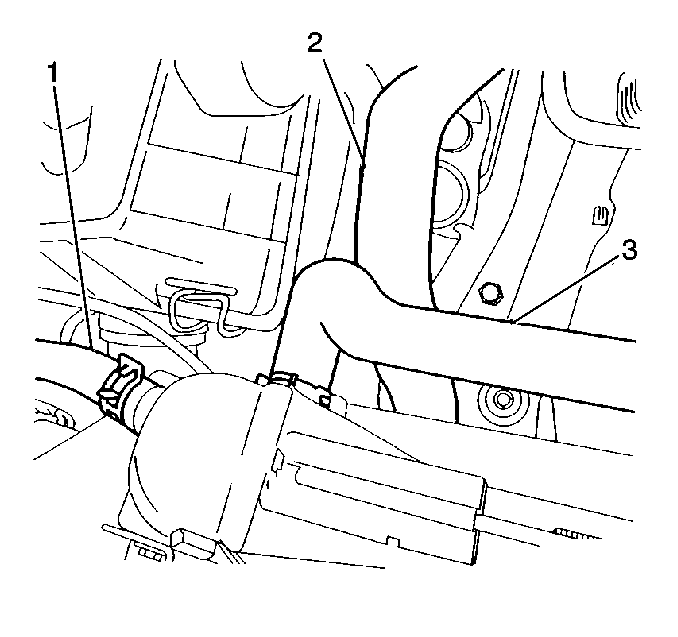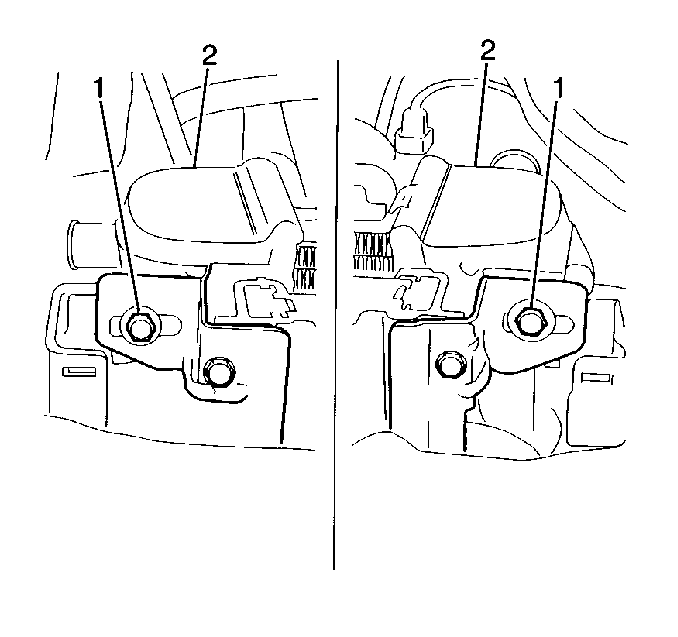Removal Procedure
Caution: Unless directed otherwise, the ignition and start switch must be in the OFF or LOCK position, and all electrical loads must be OFF before servicing
any electrical component. Disconnect the negative battery cable to prevent an electrical spark should a tool or equipment come in contact with an exposed electrical terminal. Failure to follow these precautions may result in personal injury and/or damage to
the vehicle or its components.
- Disconnect the battery negative cable.
- Remove the upper radiator covers:
| • | Release the self-locking tabs. |
| • | Remove the cover screws. |
- Drain the engine coolant. Refer to
Cooling System Draining and Filling
.
- Remove the intake air resonator. Refer to
Intake Air Resonator Replacement
in Engine Controls.
- Disconnect the electrical connectors at the following locations:
| • | The primary cooling fan |
| • | The cooling fan control switches |

- Remove the radiator air
bleed hose from the radiator.
- Remove the transmission oil cooler pipe fittings and seals from
the radiator.
- Position the pipes away from the radiator.
- Remove the coolant hose from the secondary auxiliary coolant pump.
- Remove the secondary AIR cut-off valve bracket bolts from the
fan housing.

- Remove the condenser-to-radiator
bracket bolts (1).
- Remove the radiator inlet/outlet hoses from the radiator.
- Disconnect the secondary auxiliary coolant pump connector.
- Lift and rock the radiator and primary fan together in order to
unseat the upper and lower retainers.
- Remove the radiator and the primary fan together from the radiator
support.
- Remove the primary fan bolts, if necessary.
- Remove the primary fan from the radiator.
- Remove the cooling fan control switches, if necessary.
Installation Procedure
- Install the cooling fan control switches, if removed.
Notice: Use the correct fastener in the correct location. Replacement fasteners
must be the correct part number for that application. Fasteners requiring
replacement or fasteners requiring the use of thread locking compound or sealant
are identified in the service procedure. Do not use paints, lubricants, or
corrosion inhibitors on fasteners or fastener joint surfaces unless specified.
These coatings affect fastener torque and joint clamping force and may damage
the fastener. Use the correct tightening sequence and specifications when
installing fasteners in order to avoid damage to parts and systems.
- Install the primary
fan to the radiator, if removed:
Tighten
Tighten the bolts to 4 N·m (35 lb in).
- Install the radiator and primary fan together to the radiator
support:
| • | Engage the upper retainers in the radiator support brackets. |
| • | Engage the tabs on the bottom of the radiator in the lower retainers. |
- Connect the secondary auxiliary coolant pump connector.
- Install the radiator inlet/outlet hoses to the radiator.

- Install the condenser-to-radiator
bracket bolts (1) until fully seated and not stripped.
- Install the secondary AIR cut-off valve bracket to the fan housing.
- Install the bracket bolts.
Tighten
Tighten the bolts to 4 N·m (35 lb in).

- Install the coolant hose
to the secondary auxiliary coolant pump.
- Install the transmission oil cooler pipe fittings and seals to
the radiator.
Tighten
Tighten the fittings to 25 N·m (18 lb ft).
- Install the radiator air bleed hose to the radiator.
- Connect the electrical connectors at the following locations:
| • | The primary cooling fan |
| • | The cooling fan control switches |
- Install the intake air resonator. Refer to
Intake Air Resonator Replacement
in Engine Controls.
- Fill the cooling system. Refer to
Cooling System Draining and Filling
.
- Install the upper radiator covers:
| • | Insert the self-locking tabs. |
| • | Install the cover screws. |
- Connect the battery negative cable and reprogram all applicable
accessories. Refer to
Reprogramming Accessories After Battery Disconnect
in Engine Electrical.




